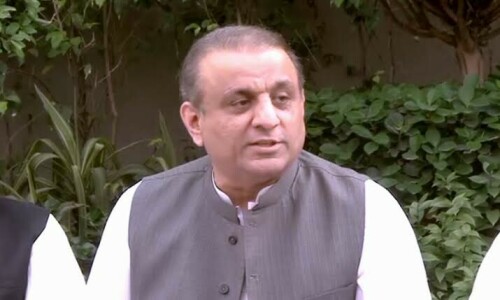BANGKOK: Thailand’s fallen premier Thaksin Shinawatra vowed to stay out of politics as rapturous crowds welcomed him home, but analysts say he plans to keep close tabs on his allies running the government.
Thousands of supporters cried, cheered and swooned at Bangkok airport on Thursday as Thaksin triumphantly emerged and kissed the ground, marking the end of an exile which began after the September 2006 coup which ousted him.
The 58-year-old former prime minister has already orchestrated a stunning political comeback, after tapping veteran politician Samak Sundaravej to rally his supporters in the new People Power Party, which won elections in December.
Samak, a charismatic but combative right-winger, took on the role of prime minister with gusto perhaps a little too much gusto for Thaksin’s liking, analysts said, prompting his earlier-than-expected return.“He has got worried about Samak’s independence,” said Chris Baker, a historian who penned a book about Thaksin.
“Samak, almost as soon as he got off his knees after getting the appointment, surprised us all and he has been very clever and has made us wonder how far he is under Thaksin’s control.” While Thaksin publicly says he plans to focus on charity work and his Manchester City football club, analysts say he will play a behind-the-scenes role in the government to keep Samak in check.
“His return has far-reaching political ramifications,” said Thitinan Pongsudhirak, a political analyst from Bangkok’s Chulalongkorn University.
Samak won the election by openly campaigning as Thaksin’s proxy, and now Thaksin feels the PPP’s victory is his own, Thitinan said.
“He’s returning only because he won the election, he has formed the government,” Thitinan added.
A power struggle with Samak may be on the cards, but Sombat Thamrongthanyawong, president the National Institute of Development Administration, a Bangkok university, warned of a broader conflict.
Thailand is split between the urban middle-class, many of whom despise Thaksin and supported the coup, and the rural poor, who saw Thaksin as their champion and successfully voted for his policies in the form of the PPP.
Thaksin’s foes in the People’s Alliance for Democracy, which spearheaded earlier anti-Thaksin protests, have vowed to take to the streets against any perceived interference with the courts.
“He is the only prime minister ever who can make such a great rift in the society. It is clear that supporters and opponents still have different stands, different ideas. The situation is worrisome,” said Sombat.
Most pressing for Thaksin is the need to prove his innocence against corruption charges that could land him in prison, analysts said.
“Although the judiciary is famous for blowing with the political wind and there are very serious signs that things are blowing his way, the judiciary does have some measure of independence,” Baker said.
“It is capable of taking quite serious, quite surprising decisions.” In two graft cases dating back to 2003, Thaksin is accused of using his influence as premier to win a property deal for his wife, and making fraudulent filings to securities regulators in the listing of a property company.
“The legal challenges are serious,” said Thitinan.
Thaksin has slammed the charges as politically motivated, but he and his wife Pojaman could each face up to 15 years in prison if convicted on all charges in both cases.
After a dramatic dash under police custody across Bangkok for two court hearings hours after arriving, Thaksin was freed on a combined bail of $281,000. He will return to the Supreme Court on March 12.—AFP













































Dear visitor, the comments section is undergoing an overhaul and will return soon.